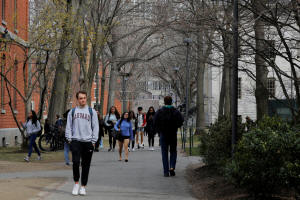Harvard faces federal civil rights probe over legacy admissions
 Send a link to a friend
Send a link to a friend
 [July 26, 2023]
By Julia Harte and Nate Raymond [July 26, 2023]
By Julia Harte and Nate Raymond
(Reuters) -The U.S. Department of Education is investigating whether
Harvard racially discriminates by favoring applicants with ties to
donors and alumni in its admissions process, according to a letter from
the agency.
The department's Office for Civil Rights opened the probe following a
complaint filed earlier this month by three civil rights groups, who
argued that Harvard's preference for "legacy" undergraduate applicants
overwhelmingly benefits white students, in violation of a federal civil
rights law.
Many colleges and universities use legacy admissions policies, but they
have drawn renewed scrutiny since June, when the Supreme Court struck
down race-conscious policies adopted by Harvard College and the
University of North Carolina to ensure more non-white students are
admitted.
Applicants with legacy or donor ties to Harvard College, the
undergraduate school of Harvard University, are nearly 70% white, and
six to seven times more likely to be admitted than regular applicants,
according to the complaint.
Those statistics were calculated from Harvard admissions data that
became public as a result of the case that the Supreme Court decided in
June. The Education Department is expected to collect more current data
in the course of its investigation.

A Harvard spokesperson said the Cambridge, Massachusetts-based Ivy
League school is reviewing aspects of its admissions policies to ensure
it can continue admitting a diverse student body following the Supreme
Court's decision.
"Harvard remains dedicated to ... redoubling our efforts to encourage
students from many different backgrounds to apply for admission," the
Harvard spokesperson, Nicole Rura, said in a statement.
The Education Department through a spokesperson confirmed it had an open
investigation under Title VI of the Civil Rights Act of 1964, which bars
race discrimination for programs receiving federal funds. The agency had
no further comment.
[to top of second column]
|

Students and pedestrians walk through
the Yard at Harvard University, after the school asked its students
not to return to campus after Spring Break and said it would move to
virtual instruction for graduate and undergraduate classes, in
Cambridge, Massachusetts, U.S., March 10, 2020. REUTERS/Brian
Snyder/File Photo

Wesleyan University and the University of Minnesota's Twin Cities
campus announced they would stop using legacy admissions in July,
following a handful of other U.S. higher education institutions that
have ended them in recent years.
"Simply put, Harvard is on the wrong side of history," said Oren
Sellstrom, the litigation director of Lawyers for Civil Rights, the
Boston-based group representing the civil rights groups who prompted
the Education Department investigation.
Sellstrom spoke at a Tuesday press conference regarding the federal
probe, along with representatives for two of the Boston-area civil
rights groups represented in the complaint.
"This percentage that's being automatically accepted into Harvard is
not fair, and it is leaving our young people of color out of the
equation," said Zaida Ismatul Oliva, head of the Chica Project, an
organization offering educational and professional mentorship for
young women of color.
Edward Blum, the affirmative action opponent whose group Students
for Fair Admissions sued Harvard and secured last month's Supreme
Court ruling, said his organization too hopes that colleges end
legacy preferences.
"However, it is unlikely legacy preferences are illegal since
organizations like the NAACP and the Mexican American Legal Defense
Foundation would have brought lawsuits challenging these practices
many years ago," he said in an email.
(Reporting by Julia Harte; Editing by Nick Macfie and Daniel Wallis)
[© 2023 Thomson Reuters. All rights
reserved.]This material may not be published,
broadcast, rewritten or redistributed.
Thompson Reuters is solely responsible for this content. |